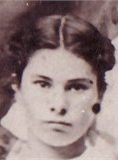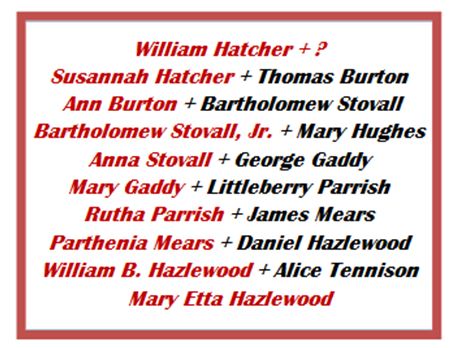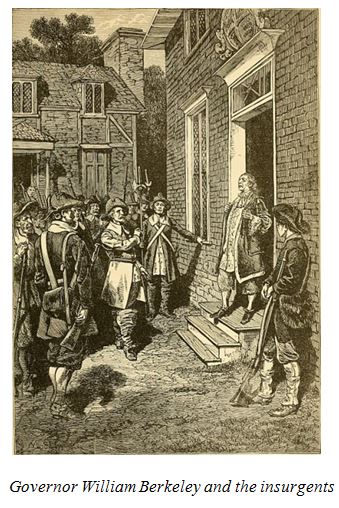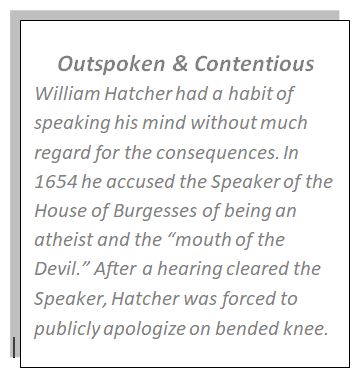1646 – c.1706
Thomas Burton settled in Bristol Parish, Virginia. In the mid 1600s, he purchased a piece of land on the Appomattox River near Swift Creek called “Cobbs Plantation” or “Cobbs Hall” after its original owner, Ambrose Cobbs. Here he and his wife Susannah reared four sons (Thomas Jr., John, Isaac, and Abraham) and a daughter, Ann. (Mary Etta Hazlewood descended through Susannah’s daughter. See chart.)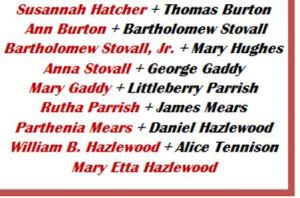
Thomas Jr. apparently had a close relationship with his Grandfather Hatcher, Susannah’s father. William Hatcher left a codicil to his will giving the boy a farm. Though generous, Hatcher was also a contentious old man who seemed to always be stirring up trouble. One such altercation took place in 1680, which is where this account begins.
“Lantroope picked up the axe as instructed.”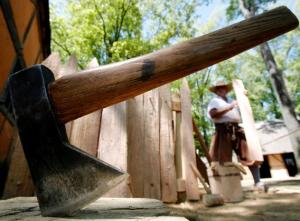
He took one good whack at the canoe owned by Mr. Robert Woodson. William Hatcher ordered Lantroope to do the same to any other boats found in the swamp. The former Burgess didn’t tolerate neighbors fishing on his land without permission.
His daughter, Susannah knew only too well how combative her father could be. Three years earlier, he had been found guilty of supporting Bacon’s Rebellion. Long ago, when she was only a child, the court forced her father to publicly apologize on bended knee for slandering a public official. This time was different, however. This time it involved her son.
Mr. Woodson sought redress in civil court for the damage done to his boat. Sixteen-year-old Thomas Jr. having witnessed the event was questioned. Susannah’s son testified “that he saw John Lantroope strike a piece out of the head of Mr. Robert Woodson’s cannoe with an axe, and that ye deponent heard Mr. William Hatcher order ye said Lantroope and his other servants to splitt all ye cannoes they found in the swampp and further saith not.”
Susannah may have wanted to keep Thomas Jr. from spending so much time with his grandfather after such an incident. But it wouldn’t matter. William Hatcher died shortly after the April court date. Her father was gone.
Five years later, the other important man in her life lay on his deathbed. An ailing Thomas Burton was about fifty when he dictated his will. In it he gifted 100 acres of land to each of his sons. Susannah widowed at age forty quickly remarried. She became the new wife of Mr. John Stewart. In turn, Stewart became a step-father to Susannah’s children.
The older couple was blessed with a child of their own. Little Mary Anne Stewart would be Susannah’s last baby. No doubt she relied on her daughter Ann to help look after her much younger half-sister. As for Susannah’s sons, the Burton boys had grown into young men. Thomas Jr. married and moved to Boston, opting for a cosmopolitan life in the busy seaport.
Bad news arrived from Massachusetts about 1691. Susannah’s eldest son had died in the prime of life at age 27. Her brother, Benjamin Hatcher traveled to Boston to help settle the estate. According to her father’s will, the farm William Hatcher had gifted to his grandson was only for Junior’s lifetime. A Virginia court awarded the land to Benjamin upon his petition.
Life went on. Susannah watched her Mary grow from toddler to little girl. At the same time, she saw her teenage daughter Ann mature into a young woman. A summer wedding in 1693 joined Ann Burton and Bartholomew Stovall, a former indenture on a neighboring plantation. Step-father John gave his surety. Susannah looked forward to many grandchildren in the years to come.
One of Susannah’s grandsons, Bartholomew Stovall, Jr. would continue the family line to later include Mary Etta Hazlewood.
Timeline
1646 Susannah Hatcher born
1676 Bacon’s Rebellion and the burning of Jamestown
1692 Salem Witch Trials (Susannah’s son lived about 15 miles from Salem.)
1700+ Susannah Hatcher Burton dies before her second husband
1706 Benjamin Franklin born
Sources
Henrico Co. Deeds & Wills 1677-92, p. 121.
Minutes of the Council and General Court of Colonial Virginia (McIIwaine), p.458; Heming’s Statutes at Large, (Hening) vol 2, pp. 551-2.
“Thomas Burton, Sr.” Thomas Burton, Sr b. Abt 1634 HenricoCo, VA d. Abt Feb 1685 HenricoCo, VA, 7 Dec. 2011, hatcherfamilyassn.com/getperson.php?personID=I40981&tree=WmtheIm.
Yates Publishing. US and International Marriage Records, 1560-1900 [database on-line]. Provo, UT, USA: Ancestry.com Operations Inc, 2004.
